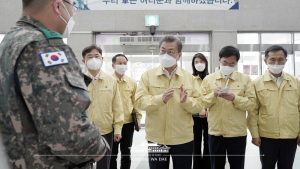A rumor has emerged in South Korea that the government sent masks to North Korea in a move to help Pyongyang to tackle the outbreak of the new coronavirus or COVID-19. The rumor came after North Korea’s state-run broadcaster aired footage to show how medical staff in the country were striving to prevent the virus outbreak. In the footage, one doctor was wearing a mask apparently produced by a South Korean firm.
The rumor spread so rapidly among citizens that the authorities had to react. South Korea’s Ministry of Unification said on March 5 that the rumor is groundless and the ministry is willing to take legal action against the continued spread of the false information.
The rapid spread of the rumor, and the ministry’s quick and forceful response, both reflect the current situation in the country: the number of confirmed cases is mounting and people are struggling to secure masks amid a supply shortage.
Amid public outcry over a lack of face masks in recent days, the government announced a series of plans to take a “full control” of supply. The Ministry of Economy and Finance said on March 5 that the government has decided to fundamentally manage the entire process of production, logistics, and distribution of masks in South Korea in order to distribute face masks swiftly and fairly to all citizens.
Other measures include a full ban on exports of masks, replacing the previous measure of allowing a maximum of 10 percent of the total domestic output for outbound shipments.
In addition, the ministry said the government will limit weekly sales of face masks sold in local pharmacies to two for every customer from March 6, while also adopting the odd-even rule from March 9: customers born on odd-numbered days can purchase masks on odd days and vice-versa.
The government’s move, however, is apparently not enough to soothe critics.
The ruling Democratic Party of Korea criticized the government in its latest party discussion for failing to secure enough masks and provide them in a timely fashion when they are needed.
Party member Kim Sang-hee also said the government is responsible for spreading “unnecessary concerns” among citizens by sending out messages that wearing masks is mandatory to be safe from the virus.
Kim cited prevention measures released by the World Health Organization, which do not suggest wearing a mask as a necessary measure. Kim said that he wonders why the South Korean government did not follow such guidelines.
Ki Dong-min, another member of the ruling party, even said the government “completely failed” South Korean people over the management and control of mask production and distribution.
The main opposition United Future Party, meanwhile, pointed out the government’s changing stance about the mask usage, which caused a “chaos” among people.
“The government told people to wear a mask, but later changed its position due to a lack of supplies of masks,” said an opposition lawmaker Park Dae-chul. “Now the government is advising people not to wear a mask if they are healthy. What a makeshift policy,” he lamented.
The government does bear some responsibilities for this “mask crisis” in South Korea, according to the CEO of the country’s largest mask manufacturer.
Park Jong-han, CEO of Welkeeps, said during the latest press interview that the crisis could have been prevented if the government had imposed the export ban on masks a bit earlier.
“It was not until February 25, when the number of domestic confirmed cases reached 900, that the government imposed restrictions on mask exports,” Park said. Meanwhile, “the demand for masks in China exploded in the wake of the virus outbreak,” he said, estimating that about 500 million masks were sent from South Korea to China in less than a month.
He added, however, the government is not 100 percent to blame for the shortage.
Park first cited a lack of raw material needed to manufacture masks, a problem that has plagued many industries as the virus disrupts global supply chains. When demands for masks began to soar in South Korea, many factories in China were shut down – first for the Lunar New Year and then over COVID-19 concerns. Many South Korean factories had difficulties securing the necessary raw materials to continue production, and domestic mask manufacturers were no exception.
Park also pointed to the selfish behavior of some retailers and small businesses that siphoned off a massive number of masks to sell them in China.
As a result, the export price, which used to be between 400 and 500 South Korean won per mask, hit more than 2,000 won before the export restriction, Park lamented.

































